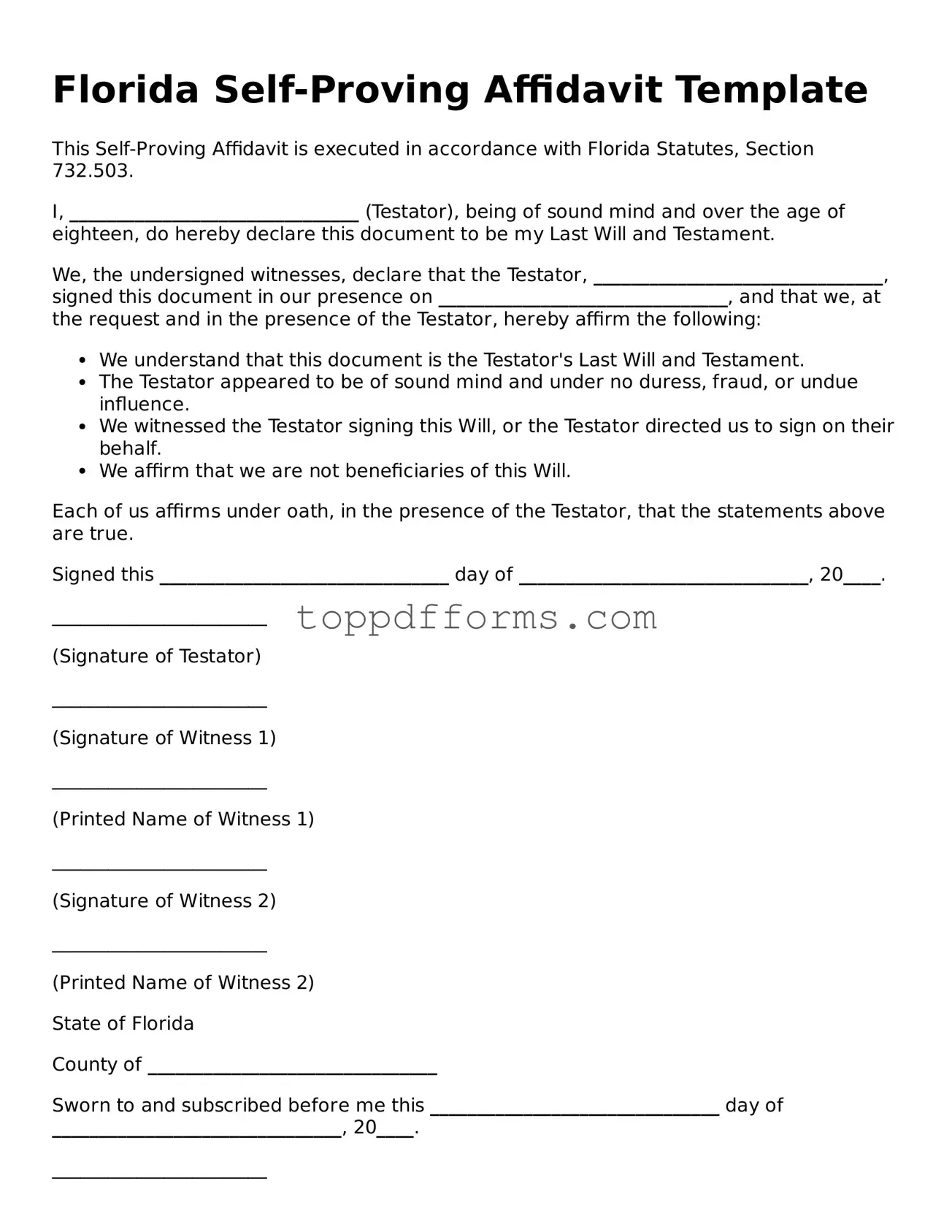Self-Proving Affidavit Document for Florida State
Things You Should Know About This Form
What is a Florida Self-Proving Affidavit?
A Florida Self-Proving Affidavit is a legal document that allows a will to be validated without the need for witnesses to testify in court. When a will is accompanied by this affidavit, it simplifies the probate process. The affidavit includes statements made by the testator (the person who created the will) and the witnesses, affirming that they signed the will in each other's presence and that the testator was of sound mind at the time of signing.
How do I create a Self-Proving Affidavit in Florida?
To create a Self-Proving Affidavit in Florida, the testator and witnesses must sign the affidavit in front of a notary public. This can be done at the same time the will is signed or afterward. The affidavit should contain specific language that confirms the identities of the testator and witnesses, as well as their understanding of the will. It is advisable to use a standard form to ensure all necessary elements are included. Once completed, the affidavit should be kept with the will to facilitate the probate process.
Is a Self-Proving Affidavit required for a will in Florida?
No, a Self-Proving Affidavit is not required for a will in Florida, but it is highly recommended. Without it, witnesses may need to testify in court to validate the will, which can complicate and lengthen the probate process. Including a Self-Proving Affidavit can save time and reduce potential disputes among heirs or beneficiaries, making it a practical choice for those creating a will.
Can I revoke a Self-Proving Affidavit?
PDF Overview
| Fact Name | Details |
|---|---|
| Purpose | The Florida Self-Proving Affidavit allows a will to be validated without the need for witnesses to testify in court, streamlining the probate process. |
| Governing Law | This form is governed by Florida Statutes, specifically Section 732.503, which outlines the requirements for a self-proving will. |
| Requirements | To be valid, the affidavit must be signed by the testator and witnessed by two individuals, who must also sign the affidavit. |
| Benefits | Using this form can reduce delays in the probate process and minimize the potential for disputes regarding the validity of the will. |
Common mistakes
Filling out a Florida Self-Proving Affidavit form can be a straightforward process, but many people make common mistakes that can lead to complications later. One of the most frequent errors is failing to properly identify the testator. The testator is the individual whose will is being affirmed. It is crucial to include their full name and any relevant identifiers to avoid confusion or disputes.
Another mistake often seen is not having the affidavit signed in the presence of a notary public. The self-proving affidavit must be notarized to be valid. If this step is overlooked, the affidavit may not hold up in court, which could lead to challenges regarding the validity of the will.
People also sometimes neglect to include the correct date on the affidavit. The date is essential as it indicates when the affidavit was executed. Without a proper date, there could be questions about the timing of the will's execution, which may affect its enforceability.
Additionally, individuals may forget to have the witnesses sign the affidavit. In Florida, the presence of at least two witnesses is required for the will to be valid. If the witnesses do not sign the affidavit, it may not serve its intended purpose, leaving the will vulnerable to challenges.
Some individuals may also fail to ensure that the witnesses are eligible. Witnesses must be at least 18 years old and must not be beneficiaries of the will. If an ineligible witness signs, it could invalidate the affidavit, creating potential legal issues down the line.
Another common oversight involves the language used in the affidavit. Some people may not express the intent clearly, which can lead to ambiguity. The affidavit should clearly state that the witnesses affirm the testator's signature and their competency at the time of signing.
Lastly, individuals often overlook the importance of keeping the affidavit with the original will. It should not be stored separately. If the affidavit is lost or not located with the will, it may complicate the probate process, causing delays and additional stress for loved ones.
Other Common State-specific Self-Proving Affidavit Forms
Texas Self Proving Affidavit - Attaching the affidavit can save time and legal resources during probate.
Self Affidavit Meaning - The document clearly outlines the roles of the testator and witnesses during the signing process.
For those looking to understand the nuances of the vehicle transaction process, exploring a detailed guide on the Motor Vehicle Bill of Sale can be incredibly beneficial. This form not only streamlines the sales procedure but also provides legal protection for both buyers and sellers. You can find more information in this indispensable overview of the Motor Vehicle Bill of Sale process.
New York Will Requirements - Beneficiaries may find it easier to access their entitlements if a Self-Proving Affidavit accompanies the will.
